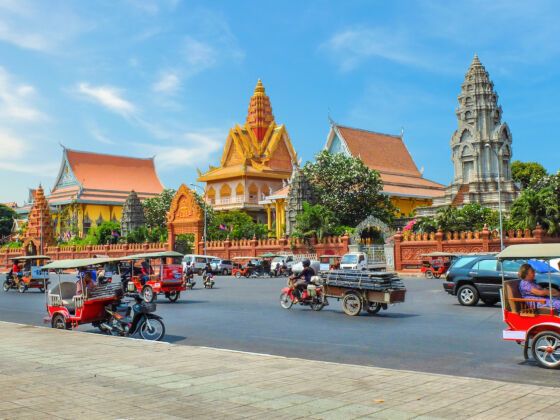EVER SINCE WORD of President Obama’s trip to Southeast Asia got out, I’ve imagined Air Force One approaching Phnom Penh, banking over the Mekong and then coming in low over Pochentong, close enough to see the spiky spires of the pagodas, the golden light reflecting off the roofs, the small white vans, black cars, motos, and tuk tuks, and finally the people on the ground. Maybe the novelty of arriving in a new country after a long flight has worn off for the President, but I hope not. I hope he is looking out the window when Cambodia comes into focus below.


Travel Advice for Obama on His Visit to Myanmar and Cambodia
And yes, I’ve seen the calls for boycotts, the well-intentioned essays that implore President Obama to stay away from Cambodia because of human rights abuses, and to cancel his trip to Myanmar because of the ongoing conflict in Kachin state. These calls come from leaders and activists of impeccable moral character, people like the Cambodian politician Sam Rainsy, and the Kachin exile Duwa Maran Zau Awng. The abuses cited in these calls to stay away are real, and horrific — particularly the brutal war in Kachin state, which is now entering its second winter.
But I think President Obama should go to Cambodia and Myanmar, and I’m heartened by his plan to visit. I hope he gives a forthright speech in each country, a speech in which he talks directly to the common people, and addresses the hard issues head-on. This is not to say he should criticize the leaders — doing so directly would be disrespectful, and counterproductive. Rather, he should identify progress made, and urge the people of Cambodia and Myanmar to tackle the challenges that are still to come. Instead of publicly calling on President Thein Sein to end the offensive in Kachin state, for example, he could say that America prays for peace in Kachin, and he could acknowledge the service of Kachin soldiers, who fought alongside American special forces in World War II.
Where should he go?
Well, he is the President, and he is an honored guest on official business. His itinerary will largely be determined by the pomp and circumstance organized by his hosts. I hope he visits a temple in Cambodia. I hope he visits a garment factory, and speaks to the young women who man the sewing machines. I hope he stops his motorcade to drink fresh-squeezed sugarcane juice from a roadside stand.
He should visit the Killing Fields at Choeung Ek, and look into the eyes of political prisoners whose photographs are hung in Tuol Sleng, the former torture center in Phnom Penh. When he speaks of the Khmer Rouge genocide, though, I hope he mentions the American war in Vietnam. Perhaps he can’t say it (apology tour?), but America bears responsibility for creating the conditions that gave rise to the horrors of the Khmer Rouge.
There are few countries in the world that stand to lose more from climate change, and Phnom Penh, located on the Mekong River, would make an impressive platform for a speech on the issue. Traditionally, the legitimacy of Cambodian leaders was tied to the reliability of seasonal weather patterns. If the rains were late, or if the rivers flooded too early, it was seen as a sign that the King had lost his divine mandate. Perhaps it is time, once more, for leaders in all parts of the world to focus on restoring the natural rhythms of the land.
In Myanmar, President Obama will meet with the opposition leader Aung San Suu Kyi, and the symbolism of this meeting alone will make the trip worthwhile. If symbolism is all that arises from the journey, however, there will be opportunity lost. President Obama can speak of human rights, and economic opportunity, and democracy, but the most important thing he can address is the political system of federalism. The United States of America is the strongest nation on earth, and a United States of Myanmar could be a great country as well. If the central government can relinquish some local control to the states, reaching agreements with the Kachin, the Shan, the Karen, and other minority ethnic groups, it could usher in a period of peace and shared prosperity.
The vision of a federalist Myanmar was first put forth by General Aung San, the father of Aung San Suu Kyi, who negotiated the Panglong Agreement with the ethnic groups of Myanmar in 1947. In private, President Obama can urge President Thein Sein and Aung San Suu Kyi to return to the principles of Panglong. In public, he can speak to the strength of federalism, and how out of many, America is truly one.